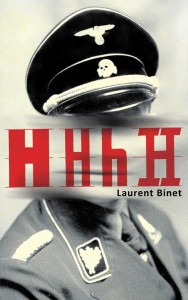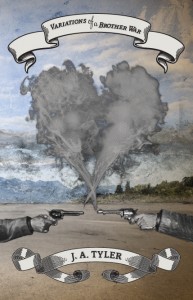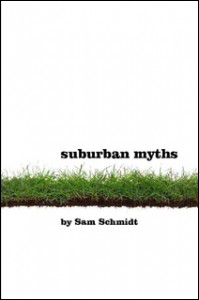Book Reviews, 08/2012
Adam Clay | A Hotel Lobby at the Edge of the World
Milkweed Editions, 2012
Jeff Simpson
 There’s a moment between diving to the bottom of a pool and the ascent for air when time slows down, the sounds muffle, and you’re suddenly aware of your own weightlessness. And for the next 20 seconds you’re more in tune with yourself and the space around you than you have been in weeks.
There’s a moment between diving to the bottom of a pool and the ascent for air when time slows down, the sounds muffle, and you’re suddenly aware of your own weightlessness. And for the next 20 seconds you’re more in tune with yourself and the space around you than you have been in weeks.
This is the same feeling I get when I read Adam Clay’s work, especially the new poems in his second collection, A Hotel Lobby at the Edge of the World. Clay’s voice carries a fluidity that never feels forced or overly clever, but simply in step with its subject, even as the subjects become complex and multi-dynamic: “What will survive of us / is not love but rather water / and sound and light. / The museums will it so.”
In his previous volume, The Wash, Clay earned a reputation for being both lyrically experimental and naturalistically driven—many of the poems were influenced by Audubon’s journals and the works of Frost, Larkin, and C. D. Wright. And while The Wash is a solid first-book, Hotel Lobby creates more of a lasting presence with poems that move effortlessly between lyric and stripped-down narratives, and they are as comfortable with natural subjects as they are with domestic landscapes:
You yearned to be
homesick
as though restlessness were the only way
you could feel at home—
for at home the icebox hums,
the heat dries our your eyes,
the hard water weighs you down.
The book covers many subjects—the state of Michigan in particular—but if anything, A Hotel Lobby sustains a tension between what we observe and our attempts to articulate those moments. We cannot experience the external world without the frameworks of memory, history, and language, and yet it’s these very tools that disconnect us from the reality we desperately want to understand: “Centering yourself along unrecorded boundaries, / it’s only when you come upon / a creek in the woods that the concept of remoteness / dawns on you.” We are doomed by our limitations, or as Clay tells us, “a fragment is as complete as a thought can be.” This incomplete feeling isn’t new poetic territory, but Clay’s execution is remarkable in its precision, and the tone he strikes—a subtle mix of hope and elegy, like fleeting Michigan summers—is pitch-perfect.
Read two poems by Adam Clay in issue 1.2
Dylan Hicks | Boarded Windows
Coffee House Press, 2012
Brian Gebhart
 Some people say that smell is the physical sense most connected to memory. For my money, though, I’d have to go with sound. When I’m in a nostalgic mood, nothing works quite like a song. Plenty of songs will tell you the same.
Some people say that smell is the physical sense most connected to memory. For my money, though, I’d have to go with sound. When I’m in a nostalgic mood, nothing works quite like a song. Plenty of songs will tell you the same.
Judging by the interplay between music and memory in Boarded Windows, I’d guess that Dylan Hicks would agree. Hicks’ first novel begins as the unnamed narrator watches Wade Salem—itinerant country musician, noted bullshit artist, and erstwhile father figure—ride away in the back of a cab. “In the trunk,” the narrator, then 21 years old, observes, “was my former guitar, a mid-priced acoustic on which three or four nights earlier Wade had played ‘Gentle on My Mind’ and ‘The Poor Orphan Child’.” The latter song crops up more than once in the novel, which is noteworthy because the narrator is an orphan of sorts. Raised by an adoptive single mother, he begins to think of Wade as a sort of stepfather during the year of his childhood in the late seventies when Wade and his mother live together. Wade eventually leaves them to play bass guitar on tour with the fictional country musician Bolling Greene, only to turn up more than a decade later, in the early nineties, to crash at the narrator and his girlfriend’s apartment in Minneapolis. This time frame serves as the focal point for most of the novel. Wade stays for several weeks, just long enough to tell the narrator stories that make him question the version of his past he received from his mother. A few weeks after Wade leaves, the narrator’s mother dies, leaving him finally, truly, orphaned.
Given this sequence of events, it seems inevitable that memory—and questions of its fidelity—are central to both his life and the story he tells about it. Since most of the figures that loom largest in his life are present for such brief interludes, the memories he has of them come to seem all the more precious for their scarcity. But like crumbling pages in an ancient book, these memories must be rebuilt from fragments, many of them secondhand, a process which involves at least as much recreation as remembrance. The narrator admits as much early in the book, acknowledging that his story “is in part drawn from other stories, from the colored and conflicting stories that Wade and my mother told me, so in spots this book will be embroidered embroidery, in service, I hope, to some fundamental emotional truth, even if at times I fear that such foundations elude me.”
This form of collage storytelling bears a great resemblance to Wade’s own rambling tales, and that’s just one of many characteristics the two men share. Both are lonely figures who exemplify a certain Midwestern bohemianism for their respective generations. Both are drawn to the promises of family life while consistently rejecting it. Both are autodidactic polymaths—a phrase whose unapologetic thorniness seems to suit them. After all, Wade is the kind of guy who, in a discussion of artistic reproduction, drops casual references to Walter Benjamin and John Berger, saying things (at least in the narrator’s telling) like: “’Cause shadows add layers of mystery…nimbi of abstraction, suggestions of perfection, and in so doing climb like dark horses closer to the fab Forms of the intellectual ether.” Our narrator mimics this trait—often piling on even more references—once describing Wade’s hair as “shiny and black, as black as an Ad Reinhardt canvas in an attic at night, as black as the vision of the painted red door, the black of the blackest stereo component, the black that, like the song by Los Bravos, is black…the same slicing part down the middle, like Geronimo, or Neil Young circa After the Gold Rush…” Perhaps most importantly, both men devote much of their time and effort to music. Wade is a journeyman musician, and when he leaves the narrator (who works at a record store) the second time, it’s to accept a gig as a D.J. in Berlin.
In addition to providing a connection point between the two characters, music also serves as a lens through which Hicks expands the scope of the novel. Hicks himself is a musician with three previous albums to his name, as well as having written about music for a number of publications. He even spent time in his early twenties working in a record store. And now, just like his main character, he’s written an erudite retrospective novel about a man who can’t stop hearing the songs of his past. To add one more layer, Hicks also released an album titled Dylan Hicks Sings Bolling Greene, which serves as a musical accompaniment to the novel. The songs represent a reinterpretation of the work of the fictional musician, but they also echo the atmosphere of the novel (purchase of the book comes with a free download of the album, whose mournful, piano-driven melodies make the cost of the book a bargain). If that’s not enough, Hicks has graciously supplied a suggested playlist to accompany the novel.
And it’s largely through these constant musical references—and the interplay between the factual and the fictional ones—that the book becomes something larger than a tale of an orphan on a decades-long search for his origin story. With the aid of music, the narrator’s story gains a measure of universality. Born at a cultural pivot point, as the fervent idealism of the sixties gave way to disillusionment and heartbreak, he comes of age in the bitter confusion of the early nineties and is still trying to make sense of it today. If that storyline has any resonance with your own memories, you would be highly advised to read Boarded Windows. You might also want to spend some time at your local record store, provided that its windows remain unboarded.
Anthony Bonds | The Moonflower King
Calypso Editions, 2012
Karen Seehaus Papson
 It seems like one out of every two aspiring writers wants to move to New York City. Struggling writers have been flocking to New York for generations in search of inspiration and opportunity in the thriving metropolis. However, in his debut novella The Moonflower King, Anthony Bonds makes the case that good writing can happen wherever there is a willing spirit. Bonds himself is both a writer and a book designer who calls San Diego, California, his home. A recent graduate of San Diego State University’s MFA program, Bonds has also published short stories in a handful of journals.
It seems like one out of every two aspiring writers wants to move to New York City. Struggling writers have been flocking to New York for generations in search of inspiration and opportunity in the thriving metropolis. However, in his debut novella The Moonflower King, Anthony Bonds makes the case that good writing can happen wherever there is a willing spirit. Bonds himself is both a writer and a book designer who calls San Diego, California, his home. A recent graduate of San Diego State University’s MFA program, Bonds has also published short stories in a handful of journals.
Bonds’ central character in The Moonflower King, Ash Moone, is a writer as well, who must return from his literary life in Brooklyn to his family home in Vatican, Texas. Ash is up to his elbows in controversy. He has written a highly successful memoir, but it turns out that he’s playing fast and loose with the truth. While Ash argues to anyone who will listen that “everything I’d written in that book was true—only not quite factual,” the liberties he’s taken with truth have created both negative publicity and amazing opportunity in the form of a rather enticing book contract. However, before Ash can crank out the tell-all book the publisher wants, he is summoned home to his family’s emu farm in order to take care of his twin brother, Oscar. A troubled soul, Oscar has failed in his attempt to take his own life—and it’s not the first time he’s tried to kill himself. In the claustrophobic town of Vatican, Ash is thrown into the thick of his family’s drama, which nearly suffocated him before. As Ash struggles to balance commitments to his own work against the needs of his now disabled brother, he discovers that his family has been keeping secrets from him. Bonds also weaves an allegorical tale, ostensibly created by Ash and Oscar’s mother, about a boy and the Moonflower King. The tale and the larger story both conjure themes of sacrifice, familial responsibility, and the complicated nature of love.
The Moonflower King is a compelling tale that quickly and completely transports the reader to small-town Texas. Bonds’ smooth, clean prose makes the journey an enjoyable one. A slew of well-executed minor characters decorate the landscape. Ash and Oscar’s parents, though both deceased, are still very much present in every aspect of the family farmhouse that Ash and Oscar share. Elvis Earl, a mute gardener with a gift for sculpting shrubbery, provides a steady presence, despite the fact that he never utters a word. Readers will appreciate unexpected moments of humor—like Elvis Earl’s imaginative topiary—in this otherwise serious work. The conclusion to this family drama feels a bit abrupt, with many loose ends left to dangle. Fans of Ash Moone will be begging Bonds for a sequel.
Laurent Binet | HHhH
Farrar, Straus, & Giroux, 2012
Sally Franson
 At the beginning of Laurent Binet’s HHhH, winner of the 2010 Prix Goncourt du Premier Roman, the French novel’s agonizing, breezily postmodern, self-reflexive narrator notes Milan Kundera’s discomfort with inventing names for fictional characters, then takes it a step further. “For what could be more vulgar than an invented character?” he asks the reader. This narrator, virtually identical to Binet according to a recent Guardian interview, clearly has a bone to pick with historical fiction, and perhaps with fiction as a whole. “Inventing a character in order to understand historical facts,” he says later, “…[is] like planting false proof at a crime scene where the floor is already strewn with incriminating evidence.” Fans of David Shields take note: accurate portrayals of history may be Binet’s primary interest, but deconstructing the modern novel is surely a close runner-up.
At the beginning of Laurent Binet’s HHhH, winner of the 2010 Prix Goncourt du Premier Roman, the French novel’s agonizing, breezily postmodern, self-reflexive narrator notes Milan Kundera’s discomfort with inventing names for fictional characters, then takes it a step further. “For what could be more vulgar than an invented character?” he asks the reader. This narrator, virtually identical to Binet according to a recent Guardian interview, clearly has a bone to pick with historical fiction, and perhaps with fiction as a whole. “Inventing a character in order to understand historical facts,” he says later, “…[is] like planting false proof at a crime scene where the floor is already strewn with incriminating evidence.” Fans of David Shields take note: accurate portrayals of history may be Binet’s primary interest, but deconstructing the modern novel is surely a close runner-up.
At last available in English due to Sam Taylor’s excellent translation, HHhH is a textbook example of postmodern metafiction (Binet calls it an infranovel) and the growing, genre-bending no-man’s-land between nonfiction and fiction.[1] The narrative that HHhH ostensibly sets out to tell – the 1942 assassination of Reinhard Heydrich, Hitler’s man with the “iron heart,” the “butcher of Prague” and Himmler’s right hand man,[2] by two British-trained members of the Czech Resistance – is constantly fragmenting, interrupted by and layered with the narrator’s painstaking attempt to tell the story with a minimal amount of fictionalization. We readers travel with the narrator to Prague in order to retrace the steps of the assassination, wring our hands with him over the question of whether Heydrich’s Mercedes was green or black, and listen to him bemoan the artificial constructions to which he sees other historical fiction writers fall prey. It is to Binet’s credit that the metafictional storyline is as compelling as the historical one, thanks to drama of the book’s making and the humor and charisma of his narrator. However, whether one enjoys the novel may hinge upon one’s (dis)comfort with placing the same value – vis-à-vis the page count, anyway – on a funny, obsessively neurotic narrator as on Reinhard Heydrich, whose “Final Solution” for the Jews in Europe may make him the least funny man in history.
Interestingly enough, Heydrich is not Binet’s intended subject. Rather, Jozef Gabçík and Jan Kubiš, the parachutists sent by the Czech government-in-exile to assassinate Heydrich, are the men Binet hopes to pay tribute to, despite his reservations over turning them into characters and (gasp!) dooming their actions to the realm of literature. And by the end of the novel, without giving away any (completely astounding, totally factual, and therefore Wikipedia-able) details, Binet accomplishes this with ease. Yet it’s very difficult to focus on Gabçík’s and Kubiš’ heroism for the first half, both because they rarely crop up in the text and because Heydrich is the kind of mesmerizing, larger-than-life villain that most fiction writers would kill for.[3] The author has caught some flak for making a caricature of Heydrich[4] instead of delving into his psychology, but such criticism is antithetical to the book’s purpose. Binet staunchly refuses to slip into free indirect narration with his characters: “I resist the temptation of the interior monologue,” his narrator writes, “and in doing so perhaps save myself from ridicule.” If one is interested in learning why Heydrich and his Nazi cronies committed such atrocities, or why Gabçík and Kubiš acted as heroes, this is not a book that will provide any answers. Mainly because, Binet argues, the questions are unanswerable. His concern lies not in the assignation of cause, but rather the differentiation between parsable literary characters and the real-life historical (and therefore fundamentally opaque) figures that populate the novel. “If they became characters because of me, I don’t wish to treat them like that,” the narrator reflects.
And yet. It’s also clear that Binet and his narrator cannot resist the delicious pull of fictional artifice. Author and narrator attempt to mend this hypocrisy by following an adage heard in writing workshops everywhere: if it’s a problem of the text, make it a problem in the text. For example, about halfway through the book the author writes, “The blood rises to [Himmler’s] cheeks and he feels his brain swell inside his skull.” And then, in the proceeding chapter, the narrator’s girlfriend, who serves as a Wise Uncle-type character, says, “What do you mean, ‘The blood rises…?’ You’re making it up!” The narrator admits that the moment was fabricated, deletes the sentence, writes a new one, and eventually puts the original sentence back in, all while providing a running commentary of his decision-making for the reader. At every turn, apologies are made for dramatization. This may be tedious for some, but it’s part of Binet’s continued attempts at verisimilitude. “I can’t resist cheap literary effects,” he confesses to the reader, and the confession ostensibly absolves him from the factual responsibility he by choice assumes.
Whether readers choose to absolve the narrator is highly dependent on how hard they fall for his charms[5]. The prose has a fast-paced, almost breathless quality, as if the narrator is so excited by the story he stumbled upon that he has no time for sentence-level pyrotechnics. As a result, HHhH is more compelling than conventional historical fiction because of the rather pleasant illusion that we as readers are participating in its construction. However, it’s worth noting that the seemingly ‘real’ intrusions by the narrator may represent the novel’s greatest artificiality. Despite Binet’s obsession with his primary narrative’s historical accuracy, he does not seem to mind turning his girlfriend into a literary device or feigning casual interjections that are both strategic and painstakingly crafted. Binet is not at the service of history in these moments, but rather the service of storytelling: as every fiction writer should be. But it is unclear if he, beneath his anti-fiction posture, is aware of his shifting alliance. Of course, William Maxwell did say that “in talking about the past we lie with every breath we draw,” no matter how dutifully we attempt otherwise. This seems particularly true when we talk about our own.
1. How Should A Person Be?: A Novel From Life, by Sheila Heti, is another recent novel that fits this bill.↩
2. “Himmlers Hirn heisst Heyrich,” or “Himmler’s brain is called Heydrich,” is the origin of the novel’s title.↩
3. This probably isn’t the most appropriate idiom, but I’m going to use it anyway.↩
4. Descriptions of Heydrich include, but are not limited to, his “hooked” nose, “negroid” mouth, and the conclusion that he was “an evil, pitiless swine.” However, Binet does recommend watching an old film, Hitler’s Madman, for an on-screen representation.↩
5. I’ll admit that I fell quite hard.↩
J.A. Tyler | Variations of a Brother War
Small Doggies Press, 2012
David Tomaloff
 I.
I.
It seems there are many J. A. Tylers, each with hammers and chisels and methods of distillation they would call their very own. The J. A. Tyler at work between the pages of VARIATIONS OF A BROTHER WAR (Small Doggies Press, 2012) is a careful architect of elegant short sentences presented in sections of 100 words each—three sets per page, each page consisting of a triptych focused on a theme unfolding around Gideon, Miller, and Eliza. Gideon and Miller are men born of the same mother; men fighting in a War that is by no means Civil; men with hearts and hands and eyes bent on a woman called Eliza, whose affections both men will gain and lose repeatedly as their stories re/unfold.
II.
The J. A. Tyler at work beneath the brother-dueling cover art scrubs away at the tidy lines often drawn between prose and poetry not unlike the J. A. Tylers that work inside of other books by other notable J. A. Tylers, but this particular J. A. Tyler summons a force behind these words that enables his compact streams to rise up like rivers and engulf the war-stricken landscape they inhabit. This J. A. Tyler reaches deep into the ground and pulls from it images formed not so very long ago; images that carry in them our collective reflections; images that suggest we have always looked something like we do now.
III.
What we look/ed like then/now is this:
Rifles
Rivers
Brothers
Fathers
Bullets
War
Mothers
Circles
Horses
Triangles
Boy
Boy
Girl
Boy
Boy
Girl
Ending,
too soon
Beginning,
too late
Longing
Cutting
Resenting
Fingers
Battlefield
Breaking
Loss
into fatigue—
Dresses soaked in light
& horses rattling to bones
IV.
This J. A. Tyler unfolds his words into sentences shaped like these:
“Eliza’s cabin is down from Gideon’s cabin. We say cabin but they are houses. We say houses but they are torches at night.”
and/or:
“What it means to be a ghost is to lose. What it means to be ghost is what it means when a war goes on without soldiers.”
V.
Those who enjoy other J. A. Tylers will undoubtedly find satisfaction with the J. A. Tyler they encounter in VARIATIONS OF A BROTHER WAR. Those whose worlds currently consist of few or no J. A. Tylers might easily find this J. A. Tyler to be a kind and welcoming introduction to the many strange and wonderful J. A. Tylers that the world has to offer.
Sam Schmidt | Suburban Myths
Beothuk Books, 2012
Barrett Warner
 If the Good Humor man were circling neighborhoods in Sam Schmidt’s debut collection, Suburban Myths, he’d be playing the soundtrack from Jaws. Disorder and misrule offer comedic supporting cameos in these poems obsessed with irony and burning to know: How is the improbable still possible?
If the Good Humor man were circling neighborhoods in Sam Schmidt’s debut collection, Suburban Myths, he’d be playing the soundtrack from Jaws. Disorder and misrule offer comedic supporting cameos in these poems obsessed with irony and burning to know: How is the improbable still possible?
Consider “Sweet Bitter,” whose speaker is crestfallen by routine, and enlivened by a slightly different outcome: “When I came home / from work, the previous/ night was still here…The corncob pipe, / still filled with ash, / next to a tiny / construction of half- / burnt matches, cross-hatched, / a fallen shelter or pile/ of wooden beams, a place / on a hillside where / a monk might meditate.”
The intimacy that follows is more tender than boudoir. Schmidt’s sex scenes rely more on mood than anatomy, as if neighbors might be watching as they take out garbage. Schmidt uses physical love as the energy which brings us back from alienation: “I/ massaged your feet, and tenderly/ beyond your knees./ That’s when you leaned/ your glistening/ face near.” The suburbs space and time are always so fixed, so unchangeable that the only way to speculate about infinity is in terms of distance and nearness.
Schmidt gets us in and out of his surreal world by giving his poems on- and off-ramps, or clover leafs, that soften his romantic dreams for self-mutilation. The ramps are his wink at us to let us know the big dance number is coming or just to provide a way to end a bedtime story gone very strange.
Other writers make music with their syntax by omitting subjects, verbs, or direct objects, a now you see ‘em now you don’t prosody. Schmidt gives us short, simple, complete sentences, which convey the information we need. In “The Coelacanth Situation” we need a lot of information. The speaker is a prehistoric fish long thought dead writing to someone it wishes were its lover. There’s a silky delivery to the fish’s longing: “The mating/ opportunities missed. The pain/ in the chest without the breath/ of life, the sense that I would burst/ forever.”
The coelacanth is one of several animals, which populate these poems. Most are predators—a snaggletoothed shark, a T-Rex, a frightening white dog—which gives the impression that picket fences are not nearly enough for the wildness within. Hardly any of these poems is without some haunting, dreamlike moment. Appropriately to a collection full of rattling knives there are several shower scenes. “Conditions for Life” begins with a wife upstairs in the shower and concludes: “I rush down the street, an envelope/ of fire forming around me.”
The twenty or so G.I. Joe poems in Section II are a lark. Schmidt does a fantastic job comparing something large—outer space, the world, hope—to something small, a G.I. Joe doll with removable feet and a hand in the shape of a pistol grip. There’s sadness: “The world/ hurtles toward a future/ that does not include us.” Schmidt develops this real estate with a political eye that lets us know the silly pranks and the shadowy terrors of suburban myths have genuine consequences that affect all of us.
